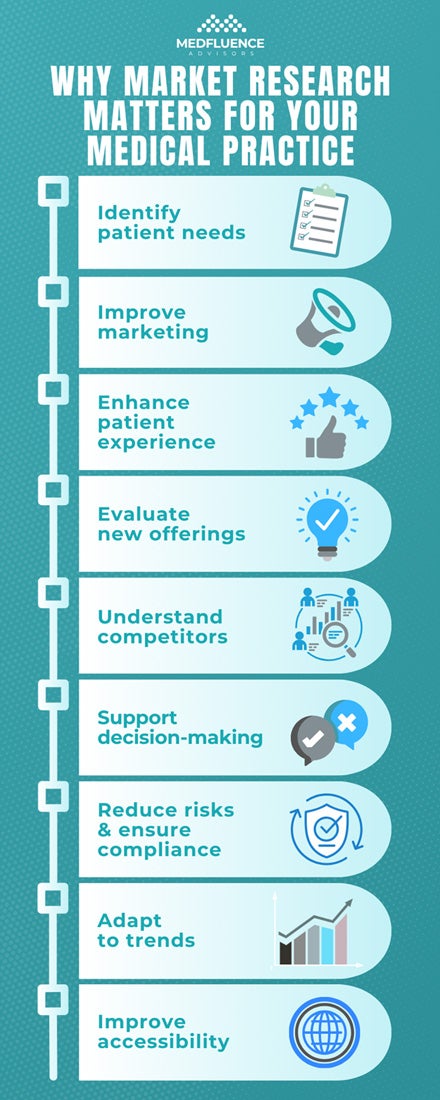How to Conduct Market Research for Your Medical Practice

The healthcare industry is complex and constantly evolving. Practitioners must adapt to changing patient expectations, technological advancements, and ever-shifting regulations. In this environment, deeply understanding patients’ needs and behaviors is critical—not only to improve care but also to grow and sustain a successful practice.
One proven way to stay ahead? Market research.
Effective market research equips practices with actionable insights about patient preferences, competitors, and industry trends—helping you make smarter, data-driven decisions.
Below, we explore what healthcare market research is, why it matters, and how your practice can get started.
What Is Market Research?
Market research is the process of gathering, analyzing, and interpreting data about your target market and customers. In healthcare, this means understanding patients’ needs, perceptions, and behaviors, as well as the broader industry landscape—including competitors, products, services, and trends.
Healthcare market research helps private practices, hospitals, pharmaceutical companies, device manufacturers, and policymakers make informed decisions. For your practice, it can improve services, strengthen patient acquisition and retention, and guide growth strategies.
Why Market Research Matters for Medical Practices
1. Identify unmet patient needs
Market research uncovers gaps between what patients want and what’s currently offered—helping you develop new services or improve existing ones.
2. Create targeted marketing campaigns
Understanding your audience’s preferences and behaviors allows for more effective, personalized marketing efforts.
3. Improve patient experience
By acting on patient feedback and insights, you can enhance service quality and satisfaction.
4. Evaluate new offerings
Before launching a new service or program, research can gauge demand and potential reception—minimizing financial risk.
5. Understand competitors
Analyzing competitors’ strengths and weaknesses helps your practice stand out and better meet patient needs.
6. Support strategic decision-making
Data-driven insights guide sustainable business growth and smarter resource allocation.
7. Reduce risks and ensure compliance
Market research can highlight potential pitfalls and help your practice stay aligned with changing regulations.
8. Keep up with trends
The healthcare landscape is dynamic. Research helps you adapt to emerging technologies, patient expectations, and market shifts.
9. Make care more inclusive and accessible
A deeper understanding of your community supports equitable, patient-centered services.

How to Conduct Market Research for Your Practice
1. Define your research objectives
Clarify what questions you need answered—such as demand for a new service, patient satisfaction levels, or competitor analysis.
2. Identify your target audience
Decide who you need to hear from—patients, staff, or other healthcare professionals—and ensure your sample accurately reflects your market.
3. Choose your research methods
- Primary research: Collect new data directly (e.g., surveys, interviews, focus groups).
- Secondary research: Analyze existing data from reports, studies, or government statistics.
Combine qualitative (opinions, motivations) and quantitative (numerical data, patterns) methods for richer insights.
4. Collect data
Use reliable tools to design surveys or conduct interviews. Keep questions clear, concise, and relevant.
5. Analyze and interpret data
Identify patterns and insights that answer your initial questions and support decision-making.
6. Present and share results
Create a clear report for stakeholders, summarizing findings, implications, and recommendations.
7. Implement and monitor
Use insights to refine services, marketing, or operations. Continuously track results and adjust strategies as needed.
Best Practices for Effective Healthcare Market Research
✅ Use appropriate platforms to reach your audience
✅ Embrace digital tools for efficient data collection and analysis
✅ Tailor questions and surveys to your target demographic
✅ Keep questionnaires concise to respect participants’ time
✅ Offer participation incentives (e.g., discounts, gift cards)
✅ Prioritize data privacy and comply with regulations
✅ Regularly review and update your research approach
Final Thoughts
Market research isn’t just a business exercise—it’s a vital tool for delivering better, more inclusive patient care. By truly understanding your patients, competitors, and market trends, your practice can make smarter decisions, improve services, and grow sustainably.
In an industry shaped by constant change, the practices that thrive are those that keep listening, learning, and adapting—and it all starts with research.



